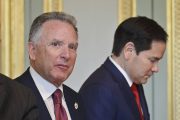
Podcast: Play in new window | Download ()
Subscribe: Android | RSS | More
As Great Britain inches closer to another Brexit deadline, the country’s politicians are making moves in advance of what promises to be a raucous two-months until the October 31 leave date. While most lawmakers in the UK — including Prime Minister Boris Johnson (shown) — favor having some sort of deal that lays out a trade and border security agreement with European Union prior to the separation, some hardliners are insisting that Great Britain leave the European Union on October 31, with or without a deal in place.
For its part, the EU is still insisting that the deal negotiated with former Prime Minister Theresa May is the only deal that the UK is going to get. Many have claimed that a no-deal Brexit, which Johnson wants to remain on the table as a bargaining chip with the EU, would be disastrous for the UK’s economy and might even lead to food and medicine shortages. Johnson has called such predictions fearmongering.
With Parliament set to come back from its summer recess on Tuesday, the House of Commons and the prime minister are steeling themselves for an epic showdown.
The first volley in the parliamentary battle was sent last week by Johnson as he and allies on the Privy Council asked the Queen to grant a suspension of Parliament from September 9 until October 14, so that a Queen’s Speech, laying out the government’s agenda for the next year, can be prepared. Usually done yearly, there has not been a Queen’s Speech since June 21 of 2017.
Her Majesty began that speech by saying, “My government’s priority is to secure the best possible deal as the country leaves the European Union.”
It would seem as if not much has changed in the UK since that 2017 speech. Great Britain, which was supposed to leave the EU on March 29 of this year, remains ensnared in the clutches of the Brussels government.
Now, Johnson, while saying that he prefers a deal based on the framework of May’s deal with significant changes, is looking to keep the no-deal option open. The suspension of Parliament may have been a move to allow less time for the House of Commons to pass legislation which would not allow Johnson the option of no-deal, which at present is pretty much his only bargaining chip to use against the EU.
Meanwhile, Johnson’s opponents, most notably Labour leader Jeremy Corbyn, are planning to introduce just such legislation, possibly as early as Tuesday, September 3. The group backing Corbyn includes fifteen members of Johnson’s own Conservative (Tory) Party.
And Johnson is not happy about that. In a statement given outside of Number 10 Downing St. on Monday, Johnson declared, “I want everyone to know there are no circumstances in which I will ask Brussels to delay: we are leaving on 31st October, no ifs or buts.”
“We will not accept any attempt to go back on our promises,” Johnson continued. “I don’t want an election, you don’t want an election. Let’s get on with the people’s agenda.”
Johnson has threatened the rebel Tories with expulsion from the party unless he gets their support. Tossing out Conservatives who won’t back him could lead to snap elections as quickly as mid-October if the party were to lose their current governing majority. Johnson cancelled plans to meet with the 15 Tory rebels on Monday.
Johnson is banking that the threat of excommunication of those Tory rebels will cause some to lose heart and back him. He and his allies believe that the only way to get the EU back to the negotiating table is the threat of a no-deal Brexit, which the EU clearly doesn’t want either.
As for the EU’s position, their chief Brexit negotiator Michel Barnier said in Sunday’s Telegraph that he was “not optimistic” for any new deal by October 31.
“On the EU side, we had intense discussions with EU member states on the need to guarantee the integrity of the EU’s single market, while keeping that [Irish] border fully open.”
The so-called “Irish Backstop” is, reportedly, the main stumbling block and impediment in the current deal. Both Irelands — the Republic of Ireland, which will remain in the EU, and Northern Ireland, a part of the UK — want assurances that the border between them will not be a hard one with walls, fencing, and checkpoints. The EU is reluctant to have that type of border situation with a non-member country.
“In this sense, the backstop is the maximum amount of flexibility that the EU can offer to a non-member state,” Barnier concluded.
But, frankly, if it wasn’t the Irish border it would be something else. The European Union and far too many politicians in the UK want to keep the situation just as it is, with Great Britain bound to the continent in the same multi-national chaos that they’re currently in. It’s as if the allies didn’t really win World War II as England is now in a European super-state dominated by Germany.
The people of Great Britain voted to get out of the EU in 2016, but politicians in the EU and in their own country seem intent on having them stay. Wish Boris Johnson luck in the next few days. He’s going to need it.
Photo of Prime Minister Boris Johnson: AP Images





